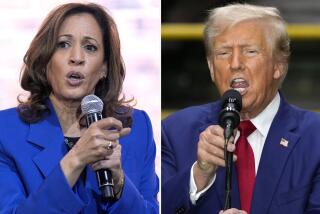U.N. official defends Afghan election despite widespread fraud
- Share via
KABUL, AFGHANISTAN — Days before the outcome of Afghanistan’s contentious presidential vote was expected to be announced, the head of the United Nations mission in the country acknowledged Sunday that widespread electoral fraud had occurred.
But the official, Kai Eide, strongly contested allegations by his former deputy that he had engaged in a cover-up of vote-rigging by supporters of President Hamid Karzai. He also expressed confidence that a partial recount, carried out by Afghan officials and now under review by a U.N.-backed body, would yield an acceptable result.
Eide described the election as “a difficult process, marred by so many problems, not least . . . by widespread fraud.” But he said oversight procedures laid out in Afghanistan’s Constitution were meant to weed out invalid votes.
“There is a united international community behind this approach, and in my view, it is the only viable road to follow,” he said at a news conference.
Eide’s highly unusual public appeal was the latest twist in the bitter election dispute, which in turn comes against a backdrop of difficult deliberations by the Obama administration over whether to send 40,000 more troops to Afghanistan, as reportedly requested by Army Gen. Stanley A. McChrystal, the top U.S. commander there. Republicans in Congress have been pressing President Obama to fulfill the request, while many congressional Democrats have questioned committing more troops to the cause.
The tainted election has been an enormous disappointment to Western powers, which had hoped that the Aug. 20 vote would provide a strong mandate to Afghanistan’s central government and help galvanize a troubled war effort. Instead, wrangling over the results has heightened ethnic tensions and disillusioned many Afghans.
At his news conference, Eide offered his most detailed rebuttal yet of accusations put forth by veteran U.S. diplomat Peter W. Galbraith, his former deputy. Galbraith was fired by U.N. Secretary-General Ban Ki-moon last month after the extent of his dispute with Eide, a Norwegian, became embarrassingly public.
Acknowledging that he and Galbraith had clashed over so-called ghost polling stations, Eide said many Afghans would have been unable to vote if he had followed his deputy’s call to close a number of stations where the security situation would prevent observers from being present.
He also denied he had covered up reports of ballot-stuffing and other forms of fraud, saying he had refused only to make public allegations that could not be independently corroborated.
The dispute has split the U.N. mission, which confirmed that four staffers who had worked for Galbraith resigned after he was fired. Eide’s defense of himself and the electoral process, however, was accompanied by a pointed affirmation of support from Western envoys.
Ambassadors from the United States, Britain, Germany and France attended his news conference in a show of solidarity, together with the senior envoys of the European Union and the North Atlantic Treaty Organization. Although the diplomats did not address reporters, their presence was clearly meant to underscore Western determination to salvage the credibility of the vote, in which Karzai is expected to emerge as the victor.
It remains to be seen, though, whether the recount, which was based on a statistical sampling, will deprive the Afghan leader of the majority he needs to avoid a runoff with his leading challenger, Abdullah Abdullah. The initial tally gave Karzai nearly 55% of the vote, but Western election observers have said at least one-fifth of the votes required additional scrutiny.
No date has been set for an announcement of the final result, but senior election officials have said it will probably be toward the end of this week. A White House decision on troop levels is expected to follow this month.
Western troops suffered their heaviest fatality levels of the 8-year-old war in July and August. Fighting tends to diminish as winter weather sets in, but both coalition troops and insurgents appear determined to deal each other heavy blows in the weeks before snowfall begins in the mountains.
In the early hours Sunday, U.S. and Afghan soldiers in Kunar province stormed a compound that had been used by an Al Qaeda commander and killed at least a dozen insurgents.
The American military did not identify the commander or say whether he was believed responsible for an insurgent attack in neighboring Nuristan province a week earlier that nearly overran an isolated U.S. base and left eight American soldiers dead.
--
More to Read
Sign up for Essential California
The most important California stories and recommendations in your inbox every morning.
You may occasionally receive promotional content from the Los Angeles Times.










